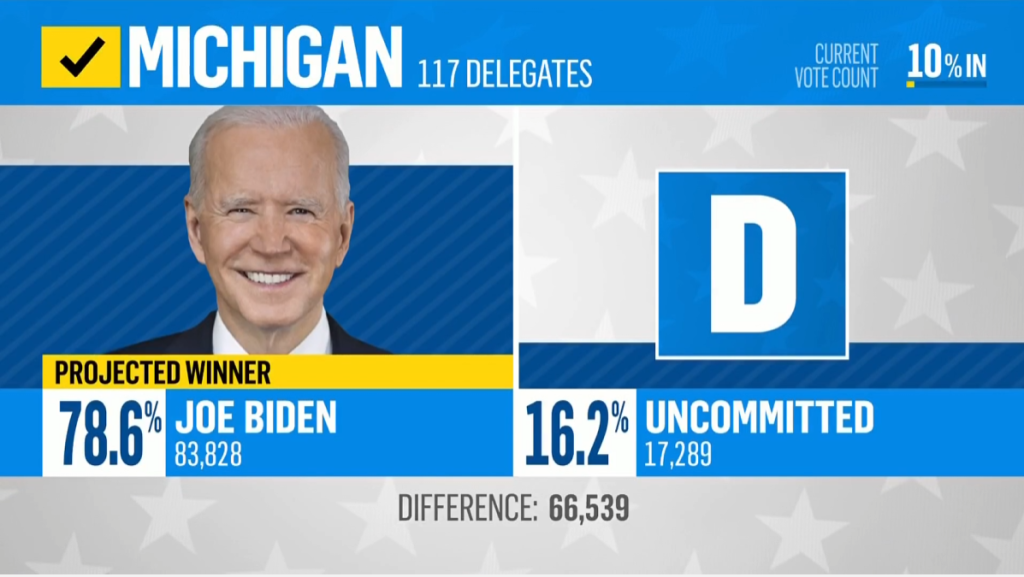
President Joe Biden easily won Michigan’s Democratic primary Tuesday, NBC News projects, in a contest whose only real drama came from a grassroots effort to cast protest votes over his handling of the war in Gaza.
A Biden victory over his rival, Rep. Dean Phillips, D-Minn., was never in doubt. The only question was the extent to which a loose-knit movement displeased with his failure to rein in the Israeli military would cut into his margin by voting “uncommitted.”
The share of “uncommitted” vote Tuesday stood at 14%, with 33% of expected votes counted. For comparison purposes, when Barack Obama ran for re-election in 2012, the uncommitted vote in Michigan’s Democratic primary was 11%.
Among those voting “uncommitted” was Rep. Rashida Tlaib, D-Mich., who is Palestinian American.
“President Biden is not hearing us,” Tlaib said in a video posted on X.
With Phillips failing to gain any momentum in his long-shot bid, Biden’s attention is firmly directed at the general election and a looming rematch with his 2020 opponent, former President Donald Trump, who NBC News projected has won the Michigan GOP primary. A Biden campaign aide, speaking in the days before Michigan’s contest, described the race as uncompetitive.
“We’re really focused on the general election,” the aide said, speaking on condition of anonymity to talk freely.
As for the “vote uncommitted” movement, the aide added: “This primary is uncompetitive, so people will use this time to speak their minds.”
High-profile surrogates visited Michigan on Biden’s behalf before the primary, speaking to union, minority and suburban voters whose support is crucial in a state Biden must win in November. Looking to mobilize voters, they touted Biden’s record and warned of the consequences of a Trump sequel.
Vice President Kamala Harris went to Grand Rapids last week to discuss abortion rights, an issue that Democratic strategists believe will galvanize suburban women in the fall.
“The people of Michigan cannot sit back and take comfort without also understanding that elections matter and that there is a full-on, concerted effort to pass a national ban, which would mean the people of Michigan would not be safe,” Harris said.
More so than any of the other primaries to date, the Michigan contest was a referendum of sorts on Biden’s support for Israel in its war with Hamas. The mounting death toll in Gaza and Biden’s refusal to demand a permanent cease-fire have damped his support inside his party.
Carol Reynoso, a Democrat from Dearborn who voted for Biden in 2020 and cast a vote Tuesday for “uncommitted,” said in an interview: “I think it’s a great opportunity to get the message to the administration that people in Michigan are concerned about what’s going on and that there’s a large group of people that want a cease-fire.”
Organizers of the “vote uncommitted” campaign hoped that if they could cut into Biden’s margin in Michigan, they could pressure him to change course and use his leverage with the Israeli government to pull back its forces.
If the uncommitted vote exceeds 15% in any congressional districts or statewide, Michigan will send at least some delegates to the Democratic National Convention in August who are not pledged to Biden.
There is not much time for Biden to reunify a party that has splintered over the war, some Democrats said. Even if Biden were to bring about a cease-fire in Gaza, there would still need to be a “healing” period before Democrats were again comfortable with his leadership, said Rep. Ro Khanna, D-Calif., who met with students and Arab leaders in Michigan last week.
“There needs to be an urgent course correction, and by that I don’t mean months,” Khanna said in an interview. “I mean weeks. And there will have to be thinking and strategy for how we win back this community.
“There needs to be an understanding that when there’s a course correction there still needs to be time for healing and for the anger to subside,” he added. “It’s not going to be ‘OK, the president called for a cease-fire and the war is over,’ and two days later you have everyone suddenly behind the president.”
Anger toward Biden is hard to miss. At a Mexican restaurant in Lansing last week, the Ingham County Democratic Party met and passed a resolution calling for a cease-fire. The vote was unanimous, with Jewish members among those voting in favor.
Marshall Clabeaux, 30, sponsored the resolution. He is a loyal Democrat who estimates that he has knocked on more doors for Democratic candidates than anyone else in Michigan over the past decade. Now, he said, he is “broken” over the suffering and death in Gaza.
“If he [Biden] doesn’t change course, it’s very difficult for me to vote for him in November,” he said.
Equally hard to miss is Democratic animosity toward Trump.
As in Biden’s 2020 victory over Trump, one of the wellsprings of his support is voters’ distaste for the ex-president. Susan Titus, 79, a retired college professor who lives in Detroit, voted for Biden and said her anger toward Trump was a primary reason.
“I think he’s pretty much an a——, to coin a phrase,” she said of Trump. “And it’s terrifying to me, at 80, to think that he … could decimate social programs that I’ve been committed to and worked on for a very long time.”